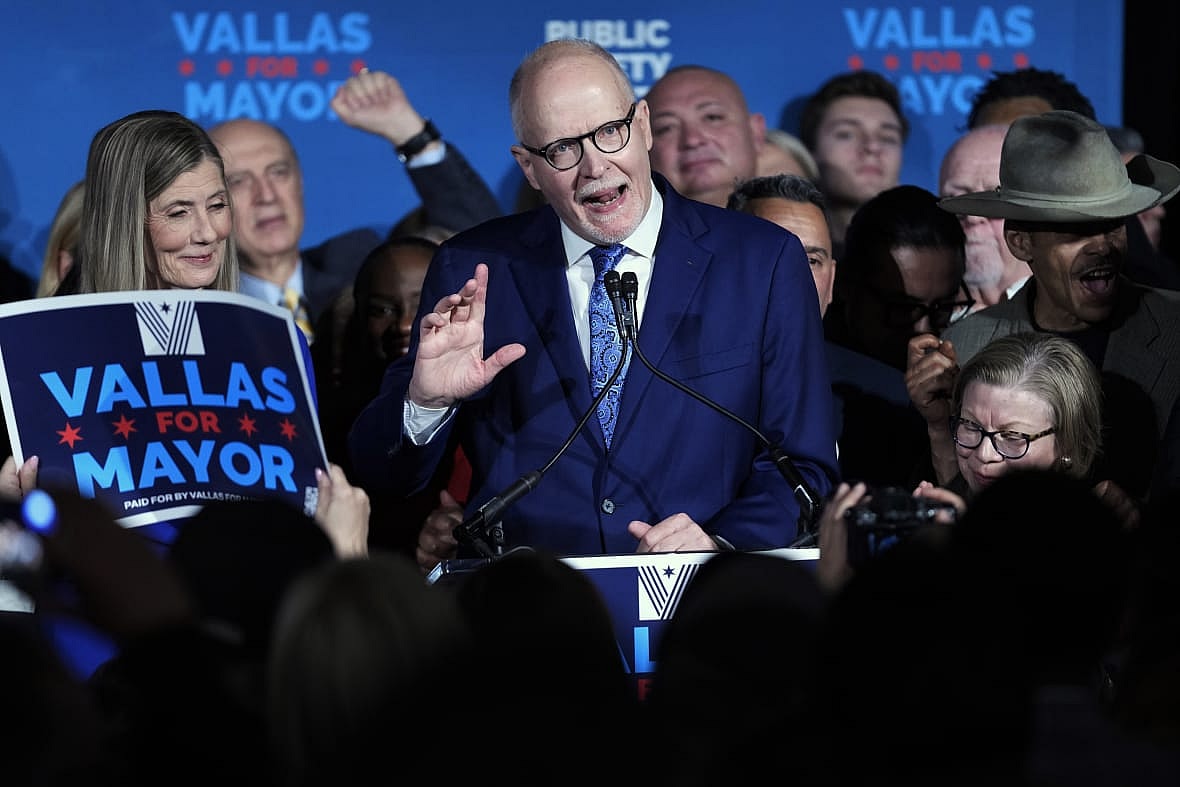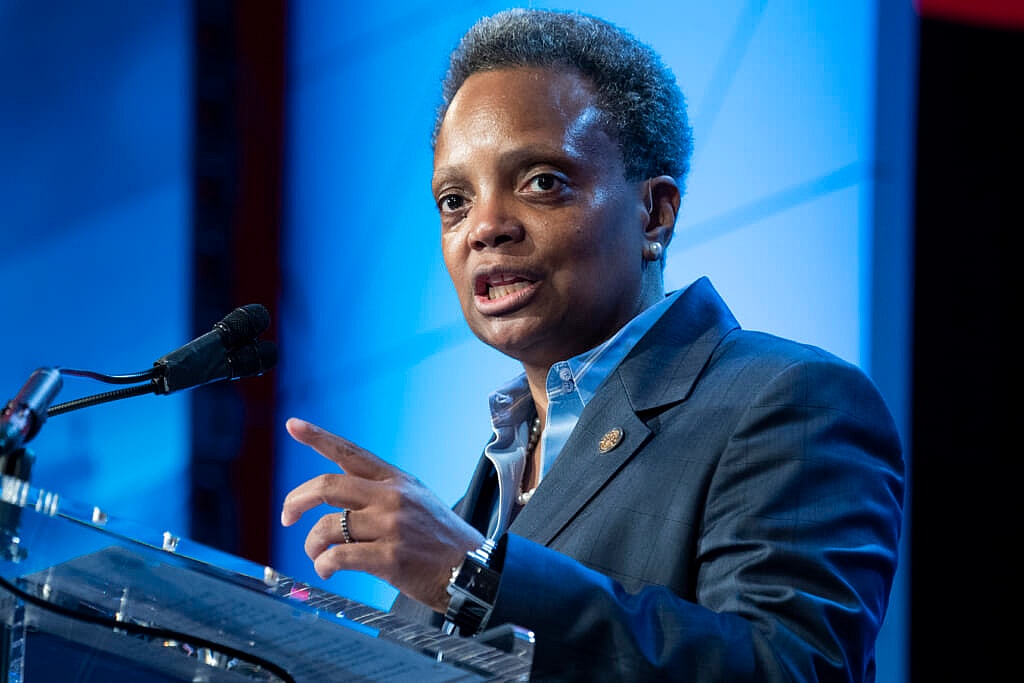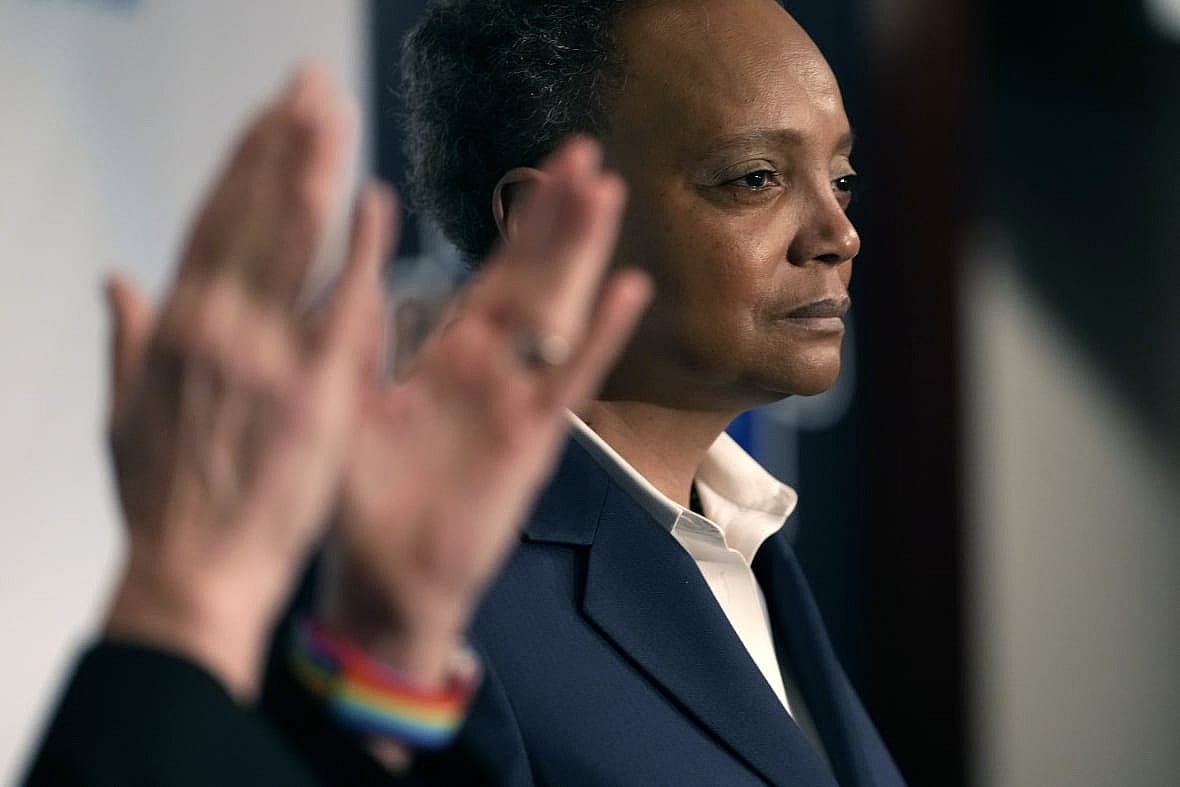CHICAGO (AP) — Four years ago, Paul Vallas finished toward the bottom of the pack in a crowded race for Chicago mayor. Trying again, focused this time on crime, he was the top vote getter Tuesday, toppling the incumbent mayor and advancing to an April runoff to lead one of the country’s largest cities.
His new campaign message, concentrated on citizens’ safety and support for the police, resonated with voters in this Democratic city in a way it might not have before the COVID-19 pandemic, when rates of violent crime spiked.

“Public safety is the fundamental right of every American. It is a civil right,” Vallas told a cheering crowd at his victory party. “We will have a safe Chicago. We will make Chicago the safest city in America.”
That would be a tall order. But Vallas, a moderate Democrat endorsed by the police union, is promising what many voters want to hear, including plans to hire hundreds more police.
Those voters will have a choice. In the April runoff, Vallas will face Brandon Johnson, a progressive who is backed by the Chicago Teachers Union and says more money for police and incarceration isn’t the answer to making the streets safer.
Both of them finished ahead of Mayor Lori Lightfoot — 34% for Vallas, 20% for Johnson and 17% for Lightfoot, who was criticized for her response to the increased crime and will depart as the first one-term mayor in Chicago in 40 years.
The city’s election is the latest example of a churn in urban politics in the pandemic’s aftermath. Crime was a top concern for voters in races to lead both New York and Los Angeles, and in San Francisco, a district attorney was recalled after frustration about public safety. Perceptions that Democrats were soft on crime also might have hurt the party during the November midterms in House races in places like New York, where Republicans scored surprisingly strong wins in suburban districts.
It’s an issue that the GOP has hammered on and that has divided Democrats for years, particularly after the murder of George Floyd by Minneapolis police in 2020 sparked protests and calls to “defund” the police.
Even as Joe Biden won the presidency in 2020, some moderates complained that the party wasn’t quick enough to denounce the “defund” rhetoric coming from progressive activists.
Biden was able to largely neutralize that line of political attack by declaring to bipartisan applause in his first State of the Union: “The answer is not to defund the police. It’s to fund the police.”
Although his comment drew criticism from some Black Lives Matter activists and others who argue that larger problems with law enforcement persist, national Democrats have mostly been able to put that issue behind them.

But Chicago’s results showed that concern about crime is continuing to resonate down-ballot, especially in urban centers, where steadfast support for Democrats is strongest.
Joe Trippi, a veteran Democratic strategist who is working with Vallas’ campaign, said that in years of working on mayoral races he’s never seen a contest where crime was so overwhelmingly the top issue for voters. Vallas was the only candidate who made it his core focus, he noted, and his success could be a message to other Democrats.
“I think that is important, for Democrats to make clear that you can be a progressive Democrat and make crime and public safety a top priority,” Trippi said, noting that other goals can’t be achieved if people don’t feel safe.
The intraparty debate will be on full display in Chicago’s April 4 mayoral election, with Vallas and Johnson making very different cases to voters.
Like many U.S. cities, Chicago saw violent crime increase during the pandemic, recording a 25-year high of 797 homicides in 2021, though the number decreased last year and the city has a lower murder rate than others in the Midwest, such as St. Louis. There are still major concerns about an increase in robberies and carjackings and a sense that criminals seem to have grown bolder, striking in neighborhoods that haven’t historically been high targets.
Vallas, the only white candidate, performed best Tuesday in predominantly white neighborhoods that are home to large numbers of police officers and other city workers. Johnson, who is Black, did well in white, liberal areas on the city’s north side and got just enough support everywhere else to stay in second, while Lightfoot won areas with higher Black populations on the south and west sides.
Johnson, 46, is a former teacher and union organizer who sits on the Cook County Board of Commissioners. Speaking to supporters Tuesday, he recalled teaching at a school in Chicago’s Cabrini Green, a former downtown public housing complex where students could see through their windows one of the wealthiest neighborhoods in the city, and having a student tell him he “should be teaching at a good school” instead.
Johnson argues for investing more in mental health care, schools and affordable housing, not more police. He avoided using the word “defund” during the race, and his campaign said he does not want to cut the number of Chicago officers. But after the protests over Floyd’s death, he said on a radio show that defunding is “an actual real political goal,” not just a slogan. He also sponsored a nonbinding resolution on the county board to redirect money from policing and jails to social services.
“We are going to finally retire this tale of two cities,” Johnson said at his own victory party. “No matter where you live, no matter what you look like, you deserve a better, stronger, safer Chicago.”
Vallas, 69, is the former CEO of the Chicago Public Schools and led school districts in New Orleans and Philadelphia. The son of Greek immigrants, he has two sons who were police officers — one of whom is now a firefighter — and was a consultant to the Fraternal Order of Police when the union was negotiating a new contract.
He has called for hiring hundreds more officers, and says many who retired or went to work elsewhere out of frustration with Lightfoot will return if he’s mayor. He wants to return to a community policing strategy, with officers assigned to patrol each of the city’s nearly 300 police beats, and keep schools open on evenings, weekends and holidays so kids have safe places to gather.

Vallas said he wants to rebuild trust between the community and the Chicago Police Department, which is under a federal consent decree to reform its practices after a long history of abuse, particularly in Black and Hispanic neighborhoods.
“I will support our law enforcement officers, but I will also support and have a zero tolerance when it comes to violating the law or violating the Constitution,” he said.
Vallas has dismissed criticism that he is too close to the police union and its controversial leader, who equated Lightfoot’s vaccine mandate for city workers to the Holocaust and voiced support for Jan. 6 insurrectionists. Vallas contends that his endorsement comes from the rank-and-file.
Will Marshall, president and founder of the moderate Progressive Policy Institute, said crime is a vulnerability that Democrats must address, and that avoiding talk of it plays into Republicans’ hands. He said progressives nationally are focused on fighting systemic racism and not making people feel safer.
“These mayors don’t have that luxury,” he said.
TheGrio is now on your TV via Apple TV, Amazon Fire, Roku, and Android TV. Also, please download theGrio mobile apps today!

